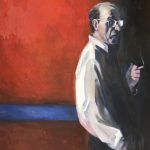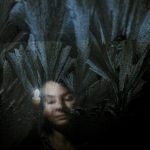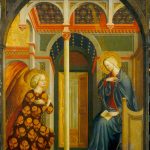Lion Relief from the Processional Way, courtesy of Yale University Art Gallery.
Artist: Unknown. ca. 605–562 B.C.
FICTION BY JANE POTTHAST
This short fictional work was originally written for a course on ekphrasis. Ekphrasis is a Greek term for a literary description of a work of art. Whether in poetry, fiction, or criticism, vividly describing a particular painting or statue can serve as poignant subject matter for a writer or as a device to emphasize the writer’s own themes. In the following text, I utilize a historical, fictive voice to meditate on Yale Gallery’s Lion Relief from the Processional Way (562 B.C.). I imagine the relief from the perspective of someone who might have been present at the Babylonian Ishtar Gate, a wonder of the ancient world originally lined with fierce, gold lions.
Babylon’s Ishtar-Inanna: white star goddess, lightning lover, drought of land, fertility of fields, queen of love, hostess of wars, mother of everything. She walks peacefully with ferocious lionesses, and an emblazoned trail of desert flowers follows her wherever she goes. The king, my grandfather, gave the goddess a precious blue gem gate as the entrance to the innermost part of the city. But to pass through, visitors must tread alongside one hundred and twenty of her lions bursting live from blue sea stone—sixty on either side, legs at midstride with paws rooted firm in the sand.
But some days, the heat reaches a fever pitch, and the air is breathless. Someone caught in the madness of New Year’s procession, or a single messenger running half the desert for the king, might fall from tricks of mirage—dazed by a claw bursting out of brick. One hundred and twenty desert-thirsty mouths that never close might start slinking out of the stone. I’ve seen that madness before. Remember, those are Inanna’s lions.
This is who my grandfather, my father, my brothers, my grandmothers, and the nurses all referred to when they called me “little Inanna.” Around the age of five or six, my pallor all honeyed and raw rose, I was dedicated to Ishtar-Inanna in the temple of her evening star.
The diviners poured water and silt and oils and the powders of crushed animal bones and in the choking smoke declared, “The gods have gifted the king with an incarnation, a bright flame from the torch of Inanna.” Someone screamed and I drank a poison metal that I tell myself was not blood. Was not blood, round and round in my head again. My loneliness merged with the mud and the musk of death. Nausea and fading, but then—for a second—a lion, trapped beneath the sea. That is the last thing I saw—a desperate white-gold lion to last my whole life’s memory. I was told I fell into a troubled sleep for two weeks, delirious with fever dreams. “Visitations from the gods,” the diviners explained to my livid family. When I woke, I first asked my nurse if I would be expected to tame lions. Then told her I did not want to be a gate. This was all the material that survived of my tangled sleep.
When I am expected to appear in the city, I walk with my company down the processional way, stopping at each lion to see if any are familiar, if one of them will reveal itself as the ritual cat, trapped in a bright hell on the floor of the sea. They are nuanced in color and mane but all the same in their brutal, hungry stare. One evening I went quietly with one maid and a plain linen robe. Shading my eyes from the sapphire glint, I ran my hands across the glaze of each frightful beast when one more-rough with wear, as if he had suffered longer at his post, stood out in the lapis sea. The lines of his snout were scars of grief etched onto his eternity. The eyes were not so fearsome when I looked long and close but were vulnerable, vacated by despair. The feathered mane braided like a bird’s wing could not take him anywhere, stuck as he was in this line of servitude.
I thought, He is in a line of exiles, growling for anguish and relief. But the demented gum and teeth are incised by the brick lines that make him—the pain of Inanna’s violence is built into his frame. I’d like to see him walk out of the wall, to rest my hand on his forehead till his mouth might soften into sleep’s repose.
Jane Potthast is a writer, student, and Ars Poetica poet based in New Haven, Connecticut. Jane has a B.A. and M.A. in comparative literature from Goldsmiths, University of London, and began further studies in religion and literature at Yale Divinity in September 2020. Jane prefers writing fiction, but regardless of the form or subject, she mostly approaches her work as a vessel for the exploration of spiritual themes. She hopes to channel the divine through her work, and repents often for spilling gin on her Bible.







